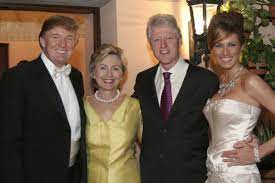
What is it with the Clinton couple? For a two-term president who led the United States through a prosperous, peaceful decade, and a two-time presidential candidate who won the national popular vote the second time around, Bill and Hillary remain remarkably vilified – to a point where they are implicated by conspiracy theorists in the death of Jeffrey Epstein and together and separately blamed for a range of calamities from Arkansas to Libya. The hostility reveals as much about politics, the media, and the nature of celebrity as much as it does about the Clintons themselves.
At least since the career of John F. Kennedy, bids to become the Leader of the Free World have been perceived as elaborate exercises of vanity, dealmaking, and out-and-out corruption. Quadrennial books like Theodore H. White’s The Making of the President series (1961-1973), Hunter S. Thompson’s stand-alone Fear and Loathing on the Campaign Trail (1973), and numerous others, have long purported to give a grimy inside perspective on outwardly honorable displays of civic duty. Emerging at the dawn of 24-hour cable news television, Bill and Hillary Clinton’s ambitions were probably no more craven than Richard Nixon’s or Ronald Reagan’s, but they were made far more visible in the personality spectacle that American presidential politics had become (see the 1992 documentary Feed). As president, too, Clinton was probably no less qualified for the demands of statecraft than Lyndon Johnson or Jimmy Carter, but his apparent playing to the pollsters and calculated attempts to split the electoral difference over every issue were widely criticized: the satirical films Wag the Dog (1997) and Bulworth (1998) could only have appeared during the Clinton administration, while harsher analyses were offered by titles such as Joe Klein’s thinly fictionalized Primary Colors (1996) and Christopher Hitchens’s No One Left to Lie To: The Triangulations of William Jefferson Clinton (1999), as well as a raft of openly partisan attacks. With the Cold War over, Bill and Hillary got to enjoy their status as Chief Executive and First Lady minus the pesky obligation of preventing World War Three, and in his insightful Life the Movie: How Entertainment Conquered Reality (1998), Neal Gabler called Bill Clinton “the first politician of the Madonna age…The public knew he was a manipulator; they had just learned to appreciate the quality of his manipulations.”
By themselves, these aspects of the Clintons’ lives and times might not have turned them into the arch-bogeys of so many amateur and professional pundits today. It was the Monica Lewinsky sex scandal – a private indiscretion that affected the reputation of the public office – which propelled the pair to their present infamy. Here the intimate relationship of the most powerful couple in the world was itself exposed as a power they might exploit. Afterwards, there would always be lingering doubts about the sincerity of Bill and Hillary’s stated positions versus their personal motivations. How much of what they said or did reflected a real commitment to the national good, or to their own marriage, and how much was cynical, scripted performance contrived only for their political gain? Again, there have always been duplicitous politicians and famous people who were big phonies behind the scenes. But the Clintons combined these stereotypes: a movie star might not be the heroic nice guy he portrays in films, but at least he’s not running the country; elected officials may secretly make all kinds of self-serving deals, but at least they don’t do it in partnership with spouses who also hold office, or want to. For all their humble origins and obvious intelligence, Bill and Hillary forever gave the ideal of meritocracy a taint of sleaze.
These shady optics of wealth, connections, and dynastic influence were troubling enough to alienate a significant number of voters in the 2016 US election: you know your perceived integrity is a problem when you lose to Donald Trump. By now, many people of all political leanings assume that current and former leaders are part of an exclusive club, giving speeches, writing books, sitting on corporate boards, and generally living off the name recognition afforded by their time in the White House, or Downing Street, or 24 Sussex Drive. Likewise, it’s expected that high-level candidates and their significant others will show off a facade of marital bliss, even when it’s a blatant act. The sense that politicians exist on a rarefied plane with billionaires and showbiz legends; that the distinction between those categories is increasingly blurred; and that working at the highest levels of government is not a humbling responsibility but a stepping stone to greater, more lucrative glamour – so long as you claim only selfless purposes, and so long as your most selfish secrets are carefully covered up – may be the Clintons’ legacies to their calling and their world.
